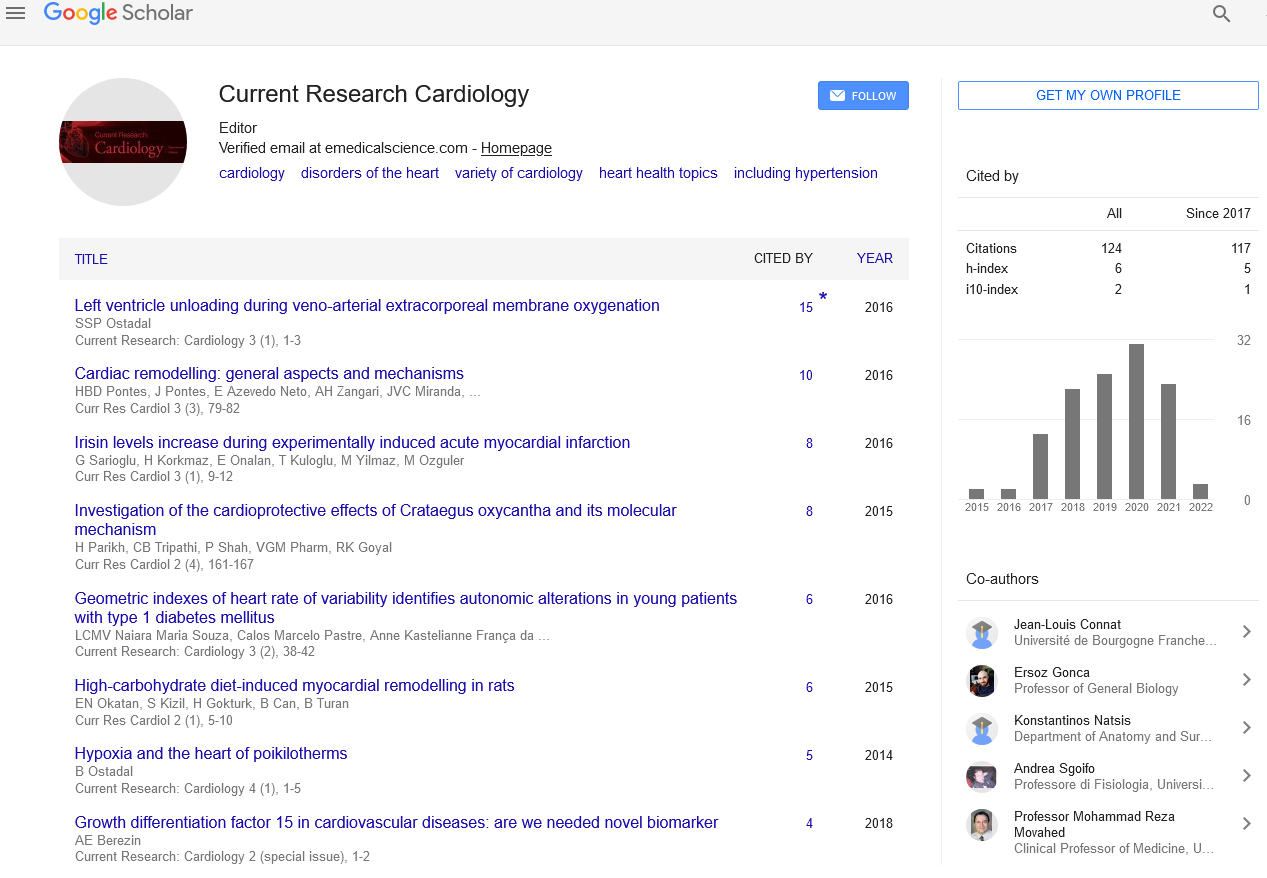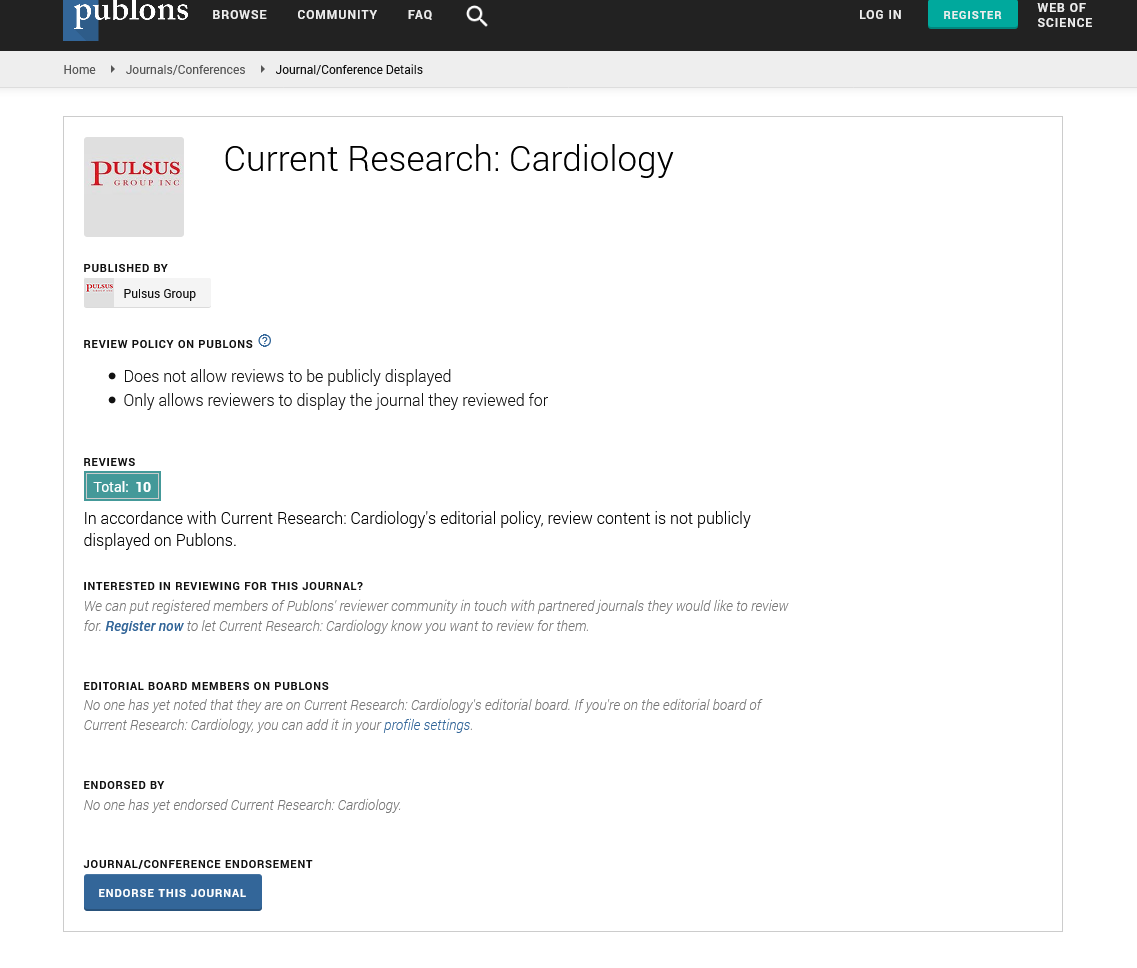Artificial intelligence in cardiology
Received: 06-Oct-2021 Accepted Date: Oct 20, 2021; Published: 27-Oct-2021
Citation: Serrano L. Artificial intelligence in cardiology. Curr Res Cardiol 2021; 8(3):2.
This open-access article is distributed under the terms of the Creative Commons Attribution Non-Commercial License (CC BY-NC) (http://creativecommons.org/licenses/by-nc/4.0/), which permits reuse, distribution and reproduction of the article, provided that the original work is properly cited and the reuse is restricted to noncommercial purposes. For commercial reuse, contact reprints@pulsus.com
Description
Cardiology is the branch of internal medicine. The term cardiology is derived from the Greek words “cardia,” which means heart and “logy” means “study of “. It is the branch of internal medicine that concerns regarding diseases and disorders of the heart, it can be range from congenital defects through to acquire heart diseases such as coronary artery disease and congestive heart failure. It also deals with the diagnosis and treatment of such conditions like Congestive Heart Failure (CHF) Coronary Artery disease (CAD), electrophysiology, valvular heart disease and heart failure. Cardiac electrophysiology, echocardiography, interventional cardiology and nuclear cardiology are included in the subspecialties of the cardiology branch. Cardiology is a branch of science, known to be a vast field that focuses on a large number of diseases specifically dealing with the heart, the circulatory system, and its functions. Besides blood tests and a chest X-ray, Electrocardiogram (ECG), holter monitoring, echocardiogram, stress test, cardiac catheterization, cardiac Computerized Tomography (CT) scan, and Magnetic Resonance Imaging (MRI) in cardiac also included in diagnosis of heart disease. The pharmacological therapy includes anticoagulants, anti-platelets, beta-blockers, anti-lipidemic drugs etc, and nonpharmacological treatment includes lifestyle changes such as eating a low-fat, low sodium diet, getting at least 30 minutes of moderate exercise, quitting smoking and limit intake of alcohol. The continuous advancement of the innovative area has empowered the industry to merge with medicine to make new integrated, reliable, and efficient techniques for providing quality health care. At present one of the on-going trends in cardiology includes the proposed utilization of Artificial Intelligence (AI) in accelerating and extending the effectiveness of the cardiologist. The innovation of artificial intelligence and machine learning are said to be influenced nearly every aspect of the human condition and cardiology is not an exception to this trend. The uses of AI includes in detecting heart diseases, treating strokes faster and enhancing diagnostic radiology capabilities. Also AI techniques are assisted as a screening tool which identifies people at risk of left ventricular dysfunction 93% of the time. AI technology allows the doctors to spend more time with their patients and improves the shared decisionmaking process. This technique will bring together the people with heart disease and those who are at increased risk of it, and detection of early risk prediction and diagnosis of serious and complex heart problems. There includes of three examples where cardiovascular medicine doctors and researchers combined AI with clinical practice for better care; helping people who had stroke, Preventing heart problems, and detecting atrial fibrillation sooner. Research innovations in cardiovascular artificial intelligences includes predicting risk at early conditions such as embolic stroke, monitoring the heart and detection of arrhythmia in smart clothing projects and development of AI technology compatible with smartphones and hightech stethoscopes. The use of AI technology in cardiology aims to focus on research and development, clinical practice, and population health.
Issues and challenges of AI in cardiology
The foremost issue in cardiology using artificial intelligence include is the ethical issues as the health care professionals prior to their practice swear to the hippocratic oath-a promise to do their best for the welfare and betterment of their patients. Because of AI many physicians argued that the use of artificial intelligence in medicine breaks this oath since patients are technically left under the care of machines than of doctors and also as machines may also malfunction, the safety of patients is also on the line at all times.






